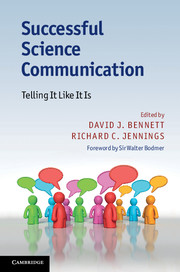Book contents
- Frontmatter
- Contents
- Foreword
- Authors' biographies
- Introduction Public engagement in an evolving science policy landscape
- Part I What it helps to know beforehand
- Part II Policy-makers, the media and public interest organisations
- 8 Research and public communication in EU policy and practice
- 9 Tackling the climate communication challenge
- 10 Dealings with the media
- 11 Dealings with the U.S. media
- 12 Relations with public interest organisations: consumers
- 13 Relations with public interest organisations: patients and families
- 14 Relations with environmental organisations: a very personal story
- Part III What you can do and how to do it
- Part IV And finally, evaluating and embedding science communication
- Index
- Plate section
- References
11 - Dealings with the U.S. media
Published online by Cambridge University Press: 05 May 2013
- Frontmatter
- Contents
- Foreword
- Authors' biographies
- Introduction Public engagement in an evolving science policy landscape
- Part I What it helps to know beforehand
- Part II Policy-makers, the media and public interest organisations
- 8 Research and public communication in EU policy and practice
- 9 Tackling the climate communication challenge
- 10 Dealings with the media
- 11 Dealings with the U.S. media
- 12 Relations with public interest organisations: consumers
- 13 Relations with public interest organisations: patients and families
- 14 Relations with environmental organisations: a very personal story
- Part III What you can do and how to do it
- Part IV And finally, evaluating and embedding science communication
- Index
- Plate section
- References
Summary
When I train young U.S. scientists in communication, I begin by laying out some sobering facts about the state of science coverage in the American media today. It's a marvel most don't just give up right there.
Science journalism, as a press specialty in the U.S., has been decimated by technologically and economically impelled changes in the media industry. Perhaps most notably, and as documented by Cristine Russell of the Harvard Kennedy School, the number of specialized U.S. newspaper science sections has shrunken by more than two-thirds over the past two decades – from 95 in 1989 to 31 in 2009 [1]. This dismaying saga was capped in 2009 when the Boston Globe, located in a city that is a Mecca of the biotech industry, cut its Monday Health/Science section.
- Type
- Chapter
- Information
- Successful Science CommunicationTelling It Like It Is, pp. 167 - 181Publisher: Cambridge University PressPrint publication year: 2011



